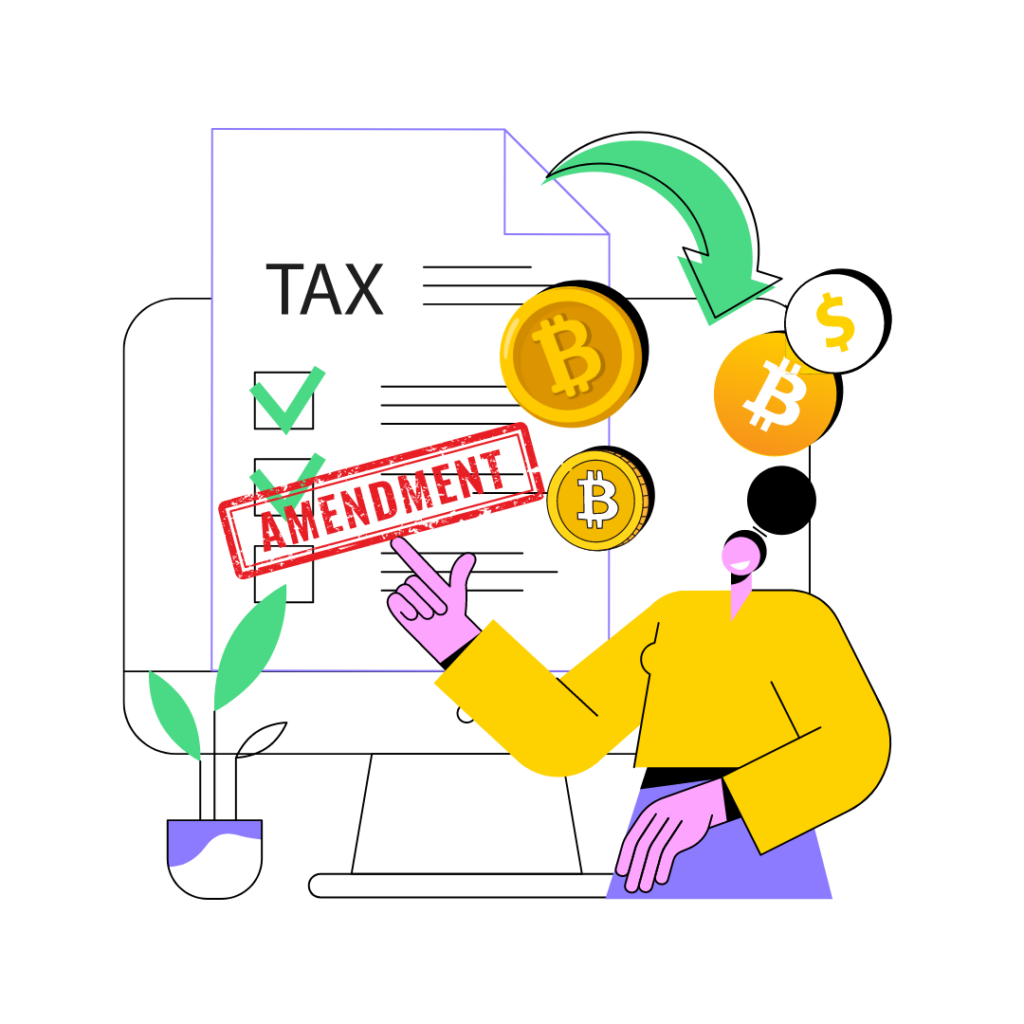Amending Tax Returns for Your Crypto Earnings: Complete Guide
Amending tax returns for your crypto earnings can be a lifesaver for many, especially in the fast-paced world of cryptocurrencies, where tax obligations can sometimes take a back seat.
You’ve probably experienced the excitement of crypto gains, only to realize later that tax reporting got lost in the shuffle. Don’t worry. You’re not alone in this puzzle.
If you’ve overlooked reporting your crypto gains in past tax returns, worry not! This comprehensive guide will walk you through the process of amending your tax returns and getting your crypto earnings in order.
Importance of Crypto Tax Reporting
Many wrongly assume that evading taxes on crypto earnings is simple due to crypto’s decentralized nature. But the truth is far from it. The IRS actively traces tax evasion through advanced analytics and blockchain tools to pinpoint disparities between reported income and actual crypto activities.
Moreover, crypto investors are under heightened scrutiny due to the potential for underreporting and misuse in this relatively new and complex asset class.
So, whether you make a profit or not, you must report all your crypto transactions on your tax return. Accurate tax reporting is not only crucial to avoid potential penalties and audits, but it also allows you to claim deductions and losses to reduce your total tax liability. In the end, it’s a win-win for everyone.
How is Crypto Taxed in the US?

Check our in-depth guide on US crypto taxes to learn about the exact tax implications of different crypto transactions. But for now, here is a brief and simplified version of how crypto is taxed in the US:
The IRS treats crypto as property, subjecting them to capital gains tax upon sale. Other than that, mining and staking rewards are considered ordinary income. Getting paid in crypto is also treated as ordinary income, with their value at receipt being taxable.
When to Amend Tax Returns for your Crypto Earnings
Amending tax returns for your crypto earnings can help mitigate the risk of audits, penalties, and interest accumulation. And just to clarify, no. Amending your tax return doesn’t increase your risk of getting audited.
But when should you amend it?
Generally, if you’re unsure about your past crypto tax reporting or want to ensure accuracy just for your peace of mind, you might want to consider filing an amended tax return. However, keep in mind that the statute of limitations for amending returns – three years from the original filing date. So, only consider amending if you’ve missed reporting your crypto gains and income within this timeframe.
The following are some specific scenarios when you should amend your crypto tax return:
Unreported Income Realization: Amend your tax returns if you’ve realized unreported crypto income from previous years. This includes gains from trading, mining, staking, and other crypto-related activities.
Accuracy and Compliance: Amend returns when you discover inaccuracies or omissions in your initial reporting.
IRS Notifications: If you receive notifications from the IRS regarding discrepancies in your reported earnings, it’s a clear sign for you to amend your returns to address these concerns.
Maximizing Deductions: If you identify missed deductions related to your crypto activities, consider amending your returns to optimize potential tax savings.
If you’re still not sure about amending, consult a crypto tax professional. They can guide you on the best course of action based on your individual situation.
Amending Your Tax Return: Step-by-Step Guide

Now that we have covered the what, why, and when, let’s move on to the actual steps to amend your tax returns for your crypto earnings:
Step 1: Calculating your Unreported Tax Liability
There are two methods to calculate your unreported crypto gains and income from past years –
- Use a crypto tax software, like Bitcoin.Tax, to automate the process of tracking and calculating your taxes
- Manually assess all your exchange and wallet activity and account for all the taxable transactions, like gains, income, airdrops, mining or staking rewards, peer-to-peer transactions, etc.
Clearly, the second approach demands a significant investment of your precious time and effort. Moreover, precision is key when reporting taxes, as even minor discrepancies can result in costly mistakes, and manual calculations are inherently more prone to errors.
Therefore, if you’re a frequent trader or investor with thousands of transactions, it’s best to utilize a tool like Bitcoin.Tax for accurate calculations and reporting.
Step 2: Obtain the Necessary Forms
To amend unreported gains and transactions, you must fill the Form 1040X, the Amended U.S. Individual Income Tax Return. You might also need other forms based on what changes you make. For instance, if you’re adding new deductions, you will need to attach Form 1040, Schedule A.
Step 3: Update Income and Deductions
After downloading the form, follow the instructions provided by the IRS to accurately fill out the form and report your unreported crypto earnings. Also, account for transaction fees, mining expenses, and any other eligible deductions related to optimizing crypto tax savings.
Step 4: Provide Explanatory Notes
After incorporating your unreported crypto earnings, it’s recommended to communicate the changes to the IRS through explanatory notes. Craft a concise yet informative explanation detailing the nature of the amendments.
Attaching this note ensures the IRS understands the context behind the amended return, preventing confusion. It can also help avoid any potential penalties or fines if you owe any.
Step 5: Submitting the Amended Return
Depending on your preference, submit the amended return either by mail or electronically by e-filing the amended returns using a tool like TurboTax. After submitting, the IRS could take over 20 weeks to process the amended returns.
Do You Have to Pay Penalties on an Amended Return?
If your unreported crypto gains and income result in additional taxes owed that you didn’t pay in past years, you can avoid penalties by amending your tax return and paying the appropriate taxes before the filing due date for the current year. There are some exceptions where you might have to pay penalties and fines, though.
Seeking Professional Assistance
Hiring a tax professional to amend crypto-related tax returns is advisable when complexities arise, especially when there is a lack of clear guidelines by the IRS on specific crypto activities. So, if you’ve engaged in frequent trading, received multiple airdrops, or dealt with complex DeFi protocols, a tax expert can guide you to ensure compliance and optimize deductions.
Additionally, if you’re a high-worth individual who made errors, omitted transactions, or misreported gains, you might also want to consider hiring a professional to rectify these mistakes accurately, as high-net-worth individuals are typically more prone to getting audited.
On the other hand, if your crypto earnings are straightforward, like a single purchase-and-hold strategy with minimal gains or losses, and if you’re well-versed in tax laws and confident in your recordkeeping, you don’t necessarily need professional assistance.
Final Thoughts
Failing to report your crypto transactions in the past doesn’t have to be a headache. By following this complete guide to amending tax returns for your crypto earnings, you’ll not only ensure compliance but may also save some taxes.